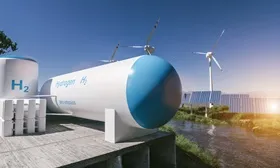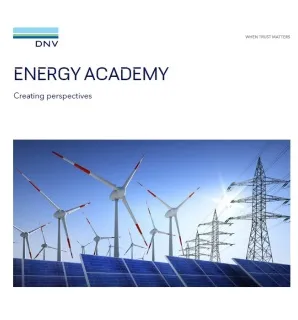Hydrogen Transmission training course
All you need to know and understand on hydrogen production, transmission and use and how to repurpose gas pipelines and gas grids for hydrogen transmission service
The energy transition is developing with increasing speed. The growing role of solar and wind energy requires large flexibility in future electricity grids and there is a general understanding that the role of hydrogen (H2) will be essential for future energy needs. As we are used to transmission of natural gas, transitioning towards hydrogen transmission will require a proper assessment and new practical and engineering standards. In this training you will learn the basics of hydrogen transmission and hydrogen blends with natural gas in relation to natural gas service. You will learn about production, transmission and use of hydrogen, and what is essential in retrofitting or repurposing existing infrastructure such as natural gas pipelines, stations and equipment to be used for hydrogen service. Safety and operational challenges in future operation will also be covered in the training. The three-day training will be supported by a tour of DNV’s Technology Centre Groningen and includes demonstrations of various hydrogen applications, providing you with practical insights into the concepts covered during the training.
Day 1
Background and introduction to hydrogen
- Background of hydrogen
- Introduction to hydrogen properties
- Technical background and safety
Retrofitting and repurposing of pipelines -integrity
- Background of hydrogen transmission and integrity
- Pipeline integrity risks
- Methods and standards for materials and integrity risk assessment
- New built pipelines, standards and certification
Day 2
Hydrogen production
- Electrolysis process
- Technology Qualification of electrolysers
- Cost of hydrogen production vs. other carriers
- Hydrogen business model and cost strategy
Hydrogen end-use
- Hydrogen as feedstock
- Industrial use of hydrogen
- Hydrogen in built environment
- Hydrogen in transportation and mobility
- Compression of hydrogen and hydrogen blends / natural gas blends
Day 3
Retrofitting and repurposing of pipelines –Functionality and capacity
- Operational scenarios
- Impact on gas velocity and physical properties
- Impact on functionality and capacity
Retrofitting and repurposing of pipelines –Flow related integrity
- Background of vibration, pulsation and erosion risk
- Assessment methods
- Assessment results and identification of gaps
- Possible risk mitigation options
- Facility tour and demos (flow sites of DNV's Technology Center Groningen)
On completing DNV’s hydrogen transmission training course, you will be able to understand the current state-of-the-art knowledge and developments in hydrogen production and transmission technologies. You will have knowledge of methods to assess and prove that pipeline operation in hydrogen or hydrogen blending service can be performed in a compliant manner. This will enable you to assess whether your transmission system or pipeline will be fit-for service, fulfilling all integrity, safety and capacity requirements.
Target Audience
The training course is intended for pipeline and grid operators and engineers who are involved in projects related to blending natural gas with hydrogen or fully converting natural gas systems to accommodate hydrogen transport.
This course is also available on request in English or Dutch (course content, location and duration can be adapted to your specific wishes). Please contact us for more information.
The energy transition is developing with increasing speed. The growing role of solar and wind energy requires large flexibility in future electricity grids and there is a general understanding that the role of hydrogen (H2) will be essential for future energy needs. As we are used to transmission of natural gas, transitioning towards hydrogen transmission will require a proper assessment and new practical and engineering standards. In this training you will learn the basics of hydrogen transmission and hydrogen blends with natural gas in relation to natural gas service. You will learn about production, transmission and use of hydrogen, and what is essential in retrofitting or repurposing existing infrastructure such as natural gas pipelines, stations and equipment to be used for hydrogen service. Safety and operational challenges in future operation will also be covered in the training. The three-day training will be supported by a tour of DNV’s Technology Centre Groningen and includes demonstrations of various hydrogen applications, providing you with practical insights into the concepts covered during the training.
Day 1
Background and introduction to hydrogen
- Background of hydrogen
- Introduction to hydrogen properties
- Technical background and safety
Retrofitting and repurposing of pipelines -integrity
- Background of hydrogen transmission and integrity
- Pipeline integrity risks
- Methods and standards for materials and integrity risk assessment
- New built pipelines, standards and certification
Day 2
Hydrogen production
- Electrolysis process
- Technology Qualification of electrolysers
- Cost of hydrogen production vs. other carriers
- Hydrogen business model and cost strategy
Hydrogen end-use
- Hydrogen as feedstock
- Industrial use of hydrogen
- Hydrogen in built environment
- Hydrogen in transportation and mobility
- Compression of hydrogen and hydrogen blends / natural gas blends
Day 3
Retrofitting and repurposing of pipelines –Functionality and capacity
- Operational scenarios
- Impact on gas velocity and physical properties
- Impact on functionality and capacity
Retrofitting and repurposing of pipelines –Flow related integrity
- Background of vibration, pulsation and erosion risk
- Assessment methods
- Assessment results and identification of gaps
- Possible risk mitigation options
- Facility tour and demos (flow sites of DNV's Technology Center Groningen)
On completing DNV’s hydrogen transmission training course, you will be able to understand the current state-of-the-art knowledge and developments in hydrogen production and transmission technologies. You will have knowledge of methods to assess and prove that pipeline operation in hydrogen or hydrogen blending service can be performed in a compliant manner. This will enable you to assess whether your transmission system or pipeline will be fit-for service, fulfilling all integrity, safety and capacity requirements.
Target Audience
The training course is intended for pipeline and grid operators and engineers who are involved in projects related to blending natural gas with hydrogen or fully converting natural gas systems to accommodate hydrogen transport.
This course is also available on request in English or Dutch (course content, location and duration can be adapted to your specific wishes). Please contact us for more information.



